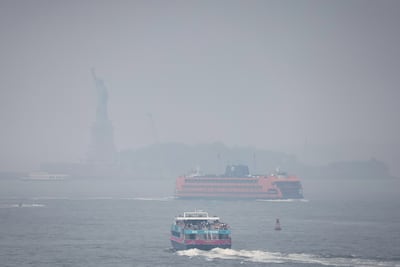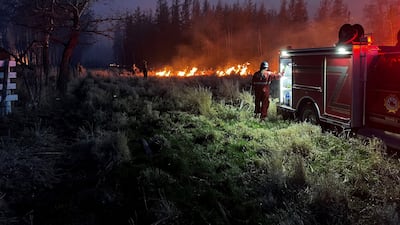Historic wildfires in Canada have resulted in appalling air quality in many US states and cities, with experts warning the worst is still to come.
About 100 million people in at least 20 states are under air quality alerts, from north-eastern Vermont to Wisconsin in the Midwest and North Carolina in the south.
Residents of cities including Chicago, New York and Philadelphia have been warned to stay inside due to the smoky and dangerous air.
“Air quality is expected to improve in the short term as a combination of thunderstorm activity and dispersion of smoke will ultimately result in improving air quality conditions for much of the country heading into the weekend,” the National Weather Service said.
Earlier this week, Chicago recorded the worst air quality in the world, with an air quality index of 175. Detroit came second at 171. Usually, the cities’ indexes are 52 and 51, respectively.
Officials warned perhaps as many as a third of Americans will experience poor air quality as a result of the blazes north of the border.
New York Mayor Eric Adams told residents to take precautions.
“If you have health conditions, including respiratory conditions such as asthma, reduce your time outdoors,” he wrote on Twitter.

With more fires predicted, American and Canadian officials had to choose whether to proceed with celebrations for both Canada Day last Saturday and US Independence Day on July 4.
Fire season began early in Canada this year and has wrought historic destruction: over 8 million hectares have been destroyed by fire so far.
In Montreal, fireworks planned for Canada Day were cancelled after a warning from health officials.
“We're in new territory here in Montreal, and we're learning how to manage the situation,” David Kaiser, deputy medical director for Montreal Public Health, told a press conference.
“In Montreal, the fireworks shows are associated with a peak of particle concentrations.”
A map updated daily by the Canadian Interagency Forest Fire Centre shows red patches reaching across Canada from Yukon in the north-west, across the heartland provinces of Saskatchewan, Alberta, Manitoba and continuing into the more populated areas of Quebec and Ontario.
On Friday morning, it noted 499 fires were blazing, of which 230 were “out of control”, 95 were “being held” and 174 were “under control”.
“We’re experiencing the biggest fire season on record since robust data begun being collected,” agency spokeswoman Jennifer Kamau told The National.
She said the country was at National Preparedness Level Five – its highest – which meant firefighters in every jurisdiction had been put to use. The country has also asked for international help.
Canada smoke engulfs Chicago – video
“There are currently, 1,550 firefighters from the US, Mexico, South Africa, Australia, New Zealand, Spain, Portugal, Chile, Costa Rica and France deployed across Canada,” she added.
Reports said about 20 people have been killed by the wildfires this year.
Amnesty International said the right to health of millions of people being forced to breathe “foul air” were being undermined, and that typically, Canada's indigenous communities were among those who suffered the most in such crises.
While fires start burning at the end May and beginning of June, they traditionally reach their peak in July and August.
Officials say the earliest fires in western and central Canada were sparked by lightning and quickly took hold because of bone-dry conditions.
Experts say fires are not only happening earlier than usual, they are also larger in size and more destructive. Such a scenario has long been predicted by scientists warning of the dangers of climate change.
Prime Minister Justin Trudeau was among those who pointed to this as a major factor.
South African firefighters warm hearts in Canada – video
“We’re seeing more and more of these fires because of climate change. These fires are affecting everyday routines, lives and livelihoods, and our air quality,” he wrote on Twitter.
“We’ll keep working – here at home and with partners around the world – to tackle climate change and address its impacts.”
Carly Phillips, a research scientist with the Union of Concerned Scientists, said she had never seen anything like what was happening in Canada.
Much of what was burning was so-called boreal forest, consisting mostly of pines, spruces and larches that usually burn one every 100 years.
“The fire season is typically most intense in July and August. So the fact we're seeing 20 million acres burnt already in June, is certainly not characteristic of what’s in line with historical patterns,” she said.
Dr Phillips said it was not possible to “prove” the current fires were made as intense as they are because of the climate crisis, but all evidence points to that.
She said that earlier this year, the UCS published a peer-reviewed paper showing about 8 million hectares of land burnt across the US West since 1986 could be attributed to heat-trapping emissions traced to the world’s 88 largest fossil fuel producers and cement manufacturers.
“It’s hard to talk about climate change without talking about fossil fuels,” she explained.
“It’s an important part of this conversation, not just because those emissions can be traced to those companies, but also because many of those companies engaged in deliberate disinformation campaigns.”
The situation in Canada is not been helped by a struggle to recruit sufficient firefighters. Reuters said a survey of Canada’s 13 provinces and territories showed it employed 5,500 so-called wildland firefighters – about 2,500 short of what is needed.

